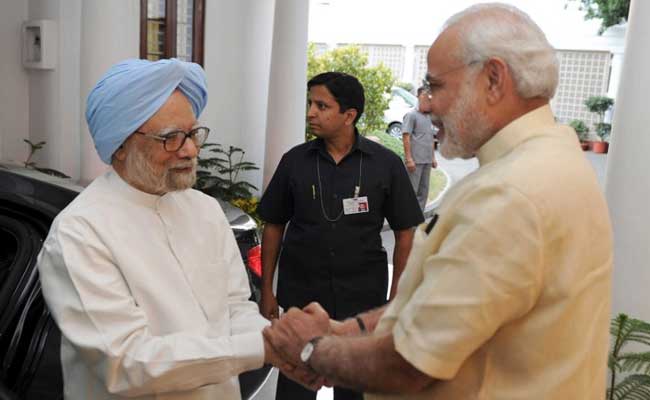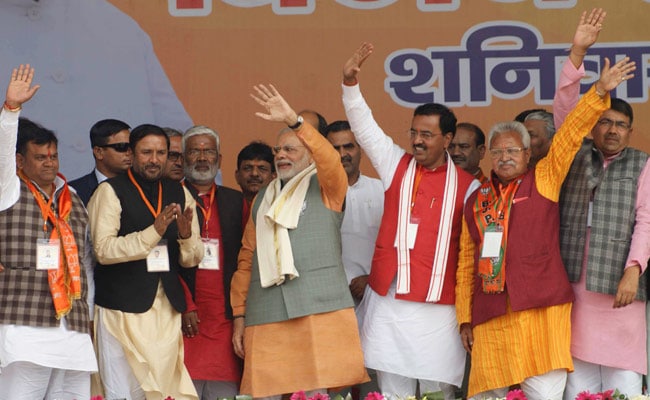The first is the "raincoat" metaphor recently used in parliament by our present Prime Minister to describe his predecessor. The second is the acronym SCAM, differently interpreted by rival parties in the current, magnificently fraught UP election.
How could one escape without a hint of scandal when scams were raining all around one, asked PM Modi? Is this not like a man who wears a raincoat in the bathroom?
This metaphor is as brilliant as it is bruising - for at least three reasons.
First, a bath is assumed to be cleansing, but this imagery startlingly reverses the premise. Here, what's being alluded to is a shower of politically tainted happenings against which a "raincoat" offered protection. Corruption and cleanliness are thus merged to great effect here. The implication is that one may appear squeaky clean, but this is only because of a "raincoat effect." The truth, it suggests, could be murkier.
Second, while the sentence was spoken in Hindi, the keywords in it were actually borrowings from English - "raincoat" and "bathroom". This bilingual usage, whether intentional or not, has the immediate effect of distancing the person being spoken about from the everyday lived context of life on the subcontinent. How many people in India use raincoats after all? The protection of choice from the rain among millions of Indians is, unquestionably, the ubiquitous umbrella or chaata. So, why was the word "raincoat" used rather than "umbrella"? Not only because it is "foreign-izing", but perhaps also because, unlike the umbrella, it sheathes the entire body. A person is at his most vulnerable and unprotected in the "bathroom", and yet, this particular individual, the image suggests, is fully armoured even in this "shame space". This is the second reversal of expectations offered by the metaphor.

PM Modi took on his predecessor, Dr Manmohan Singh, by stating that "there is not a single black mark against him despite all the corruption. Only Doctor Saab knows how to bathe with a raincoat in the bathroom." (File photo)
Third, the PM's metaphor irresistibly references the theme of the Swachh Bharat (Clean India) campaign, a signature program of his government. In this sense, this seemingly off-the-cuff image succeeds in drawing a provocative line between the inheritance of a past PM and the parliamentary presence of a current one. Designed not only to finger-point - although it does this with considerable relish - but also to aggrandize the self-image of a super-clean party with a super-clean leader, this metaphor seems poised to lodge itself in the country's political memory almost indelibly.
Moving on to another set of linguistic inventions that also connote "dirty politics", let us consider a word that we've come to embrace perhaps a little too intimately in the recent past: "scam".
In the battle for UP - where the electoral stakes are arguably higher than in any other Indian state - the PM once again set the ball rolling when he made a blistering speech in Meerut earlier this month, foregrounding demonetization and "clean-up" measures by his party. According to reports, his precise words were: "By SCAM, I mean, S - Samajwadi (Party), C - Congress, A - Akhilesh (Yadav), M - Mayawati."

Prime Minister Narendra Modi accused the Samajwadi Party, Congress and Mayawati's Bahujan Samaj Party of corruption and said the UP elections were BJP's fight against 'SCAM'
Then, the UP Chief Minister, Akhilesh Yadav of the Samajwadi Party, produced his own version. "A stands for Amit Shah and M for (Prime Minister) Modi. SCAM stands for Save the Country from Amit Shah and Modi". Finally, not to be outdone, his alliance partner in the UP election, the aforementioned Vice-President of the Indian National Congress, Rahul Gandhi, produced yet another reading of SCAM. The word, he suggested, consisted of a set of virtues that did not quite fit the character of the PM. This was because, Mr. Gandhi maintained, the acronym was to be understood as follows: "S means Service for the poor. C means Courage. A means Ability. M means Modesty."
So now - voila! - the new acronym SCAM had come full circle to mean the noble opposite of that bad old word "scam." That disconcerting reversal of meaning that we'd witnessed in the raincoat metaphor, in short, confronts us here as well. Or, as the witches in Shakespeare's Macbeth once perspicaciously said: "fair is foul and foul is fair" under certain political conditions.
Most interesting about all this scamming, though, is the special use made of the English acronym. Acronyms are overwhelmingly a "global" 20th century set of word formations that jam together several semantic concepts. For example, the UNHCR (indicating the office of the United Nations High Commissioner for Refugees) differs from the UNHRC (the United Nations Human Rights Commission) by a single letter - but decoding all this is tough. An acronym is by its nature intriguingly ambiguous, opaque. Like a raincoat, so to speak, it envelops and shields. At the same time, it "covers up".
Let it be also admitted right away that we Indians seem to just love acronyms. From the unpronounceable but worthy MNREGA to the fearsome CBI, we are singularly dedicated to these word conglomerates. The Indian landscape is littered with place-names like NOIDA and OKHLA; an IIT is distinguished from an IIIT by one letter and both from the NIIT by one consonant; NDTV is NDTV - but how often do we care to decode these walls of letters? They are mostly comforting mysteries that stand for solid institutions, places or concepts. The acronym SCAM is not of this company.
The word play on SCAM in the UP context is unusual because it designates actual people in a rapidly changing political context - Akhilesh, Mayawati, Modi, Shah. It is what is known as a "contrived acronym" - made for a particular purpose, a special moment in history. However, at least one journalist has convincingly argued that SCAM has now entered the "political syntax" of the UP elections. In that sense, the media has already immortalized it. SCAM, as a shape-shifting acronym, is here to stay in Indian political crosstalk. But will it serve us well as a talisman against corruption?
(Critical theorist and writer Rukmini Bhaya Nair is a professor at IIT Delhi. She is the author of several academic books and is one of India's best known contemporary poets.)
Disclaimer: The opinions expressed within this article are the personal opinions of the author. The facts and opinions appearing in the article do not reflect the views of NDTV and NDTV does not assume any responsibility or liability for the same.


